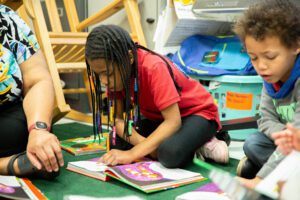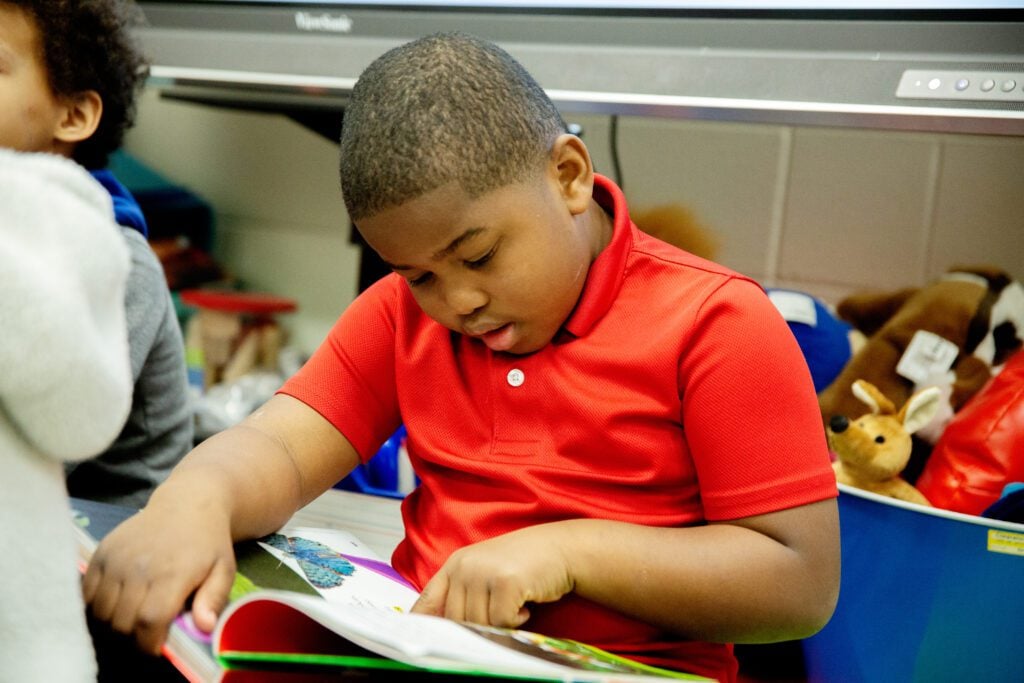Across the country, communities in the StriveTogether Cradle to Career Network are working to put more young people on a path to economic mobility. StriveTogether’s seven cradle-to-career outcome areas are critical milestones that shape a child’s educational journey and future success. Each post in this series will provide an in-depth look at one of these key areas, highlighting the challenges, opportunities and impactful strategies that can drive positive change.
Early learning is key to long-term success. Kindergartners with stronger math, reading and attention skills are more likely to thrive in third grade and have better outcomes later in life. However, although there are federally recommended domains for kindergarten readiness, the lack of a specific, recommended assessment at the national level makes measuring this outcome area a challenge for communities across the country.

In Boston, readiness assessment scores have bounced back to pre-pandemic levels thanks to collaborative work happening across the city. Cradle to Career Network member Boston Opportunity Agenda has been convening early childhood education stakeholders to standardize a measure of kindergarten readiness. Through their collaborative action, Boston Opportunity Agenda is addressing the disparate standards and assessments used by different care providers.
Boston has not had a unified measure for kindergarten readiness. BPS used Measures of Academic Progress (MAP), but this assessment does not encompass the broader aspects of kindergarten readiness, such as social-emotional learning. To address this, BPS created the Boston Public Schools (BPS) Report card, which includes social and emotional learning, science and other domains, but is still primarily used within BPS schools. Early education and care centers use other assessments like Teaching Strategies GOLD®, and early educators vary widely in their methods. The lack of a common standard prompted BPS to ask Boston Opportunity Agenda to spearhead the creation of a unified assessment approach.
Prior to the pandemic, Boston Opportunity Agenda began taking steps to convene early childhood stakeholders to bring attention to the importance of standardizing kindergarten readiness as an outcome measure across the city. As the convenings continued, stakeholders shifted from reluctance to trust and finally to agreeing to pilot a process for standardizing the measurement of kindergarten readiness across the city.

Boston Opportunity Agenda convened representatives from BPS, Head Start, early education and child care centers, fostering new dialogue. This collaborative effort included extensive research into definitions and assessments of kindergarten readiness across the United States. It became clear that the assessment needed to be non-punitive, engaging families and educators while providing a comprehensive understanding of whether children in Boston were kindergarten ready.
The collaborative discussions led to several key realizations:
Common definition and assessment: A unified definition of kindergarten readiness and a common assessment were necessary for multiple reasons:
-
- Parents need to understand what kindergarten readiness means and how to support their children.
- Early educators require insights to tailor classroom activities to meet children’s needs.
- Kindergarten teachers need to be aware of the readiness levels of incoming students to better support their transition.
- The broader field benefits from understanding the impact of initiatives at the city and neighborhood levels.
Consistent and usable assessments: The assessment had to be easy to use across different settings, from smaller family child care providers to large centers and public schools. This required simplifying the assessment to focus on key domains and indicators that could be consistently measured. Boston Opportunity Agenda and their partners decided to start with three primary domains: social-emotional development, literacy and math, reducing the indicators to a total of eight to ensure ease of use and consistency.
Alignment of indicators: As a result of the discussions, Boston Opportunity Agenda learned all stakeholders did not want to stop using their own assessments, even when they agreed there needed to be a common definition and measure for the city. Rather than insisting all stakeholders had to use one assessment, the collaborative solution was to create a crosswalk, or a chart aligning different assessments’ domains and indicators to determine which shared indicators would be assessed. This ensures that, regardless of the specific assessment used, the metrics measured are consistent across the city.
As a result of these efforts, and to ensure the validity and reliability of the chosen indicators, Boston Public Schools Department of Early Childhood, in coordination with Boston Opportunity Agenda and the Mayor’s Office of Early Childhood, is currently piloting the modified assessment in their classrooms. This includes those who are part of the Universal Pre-K initiative, which is expanding into centers and family child care. The pilot phase involves rigorous testing to ensure the assessment measures the right indicators and provides meaningful data for educators and parents.
Throughout this process, building trust among stakeholders has been crucial. Boston Opportunity Agenda played a significant role as a convener, bringing together various systems that previously worked independently. This collaboration is not only about creating a common assessment but also about fostering a unified approach to early childhood education in Boston.
The assessment aims to be unbiased, providing extra training and support where needed to ensure all children are ready for kindergarten.

In addition to the kindergarten readiness assessment, Boston Opportunity Agenda is also working on the “Screen Every Child” initiative. This project aims to build systems around early screenings for developmental delays, addressing challenges such as long wait times for diagnoses and connecting families to necessary resources. Additional early childhood initiatives — including a comprehensive summer school program which introduces curriculum concepts to children entering kindergarten as well as newcomer supports for English Language Learners — ensure that all children receive the support they need early on.
Their community is beginning to see results thanks to these collaborative efforts. Despite pandemic-related setbacks, MAP scores have bounced back, from 63% in 2022 to 67% in 2023 — an increase over pre-pandemic levels.
Overall, Boston Opportunity Agenda’s work exemplifies the importance of collaboration and community involvement in early childhood education. By leveraging their crucial role as a local convenor in service of a shared cradle-to-career vision, they’re helping to create a more supportive educational landscape for Boston’s youngest learners.
Kindergarten readiness is one of the seven key outcome areas addressed by the Network — all critical steps on the path to economic mobility. Learn more about the importance of kindergarten readiness in the StriveTogether cradle-to-career outcome guide, here.






